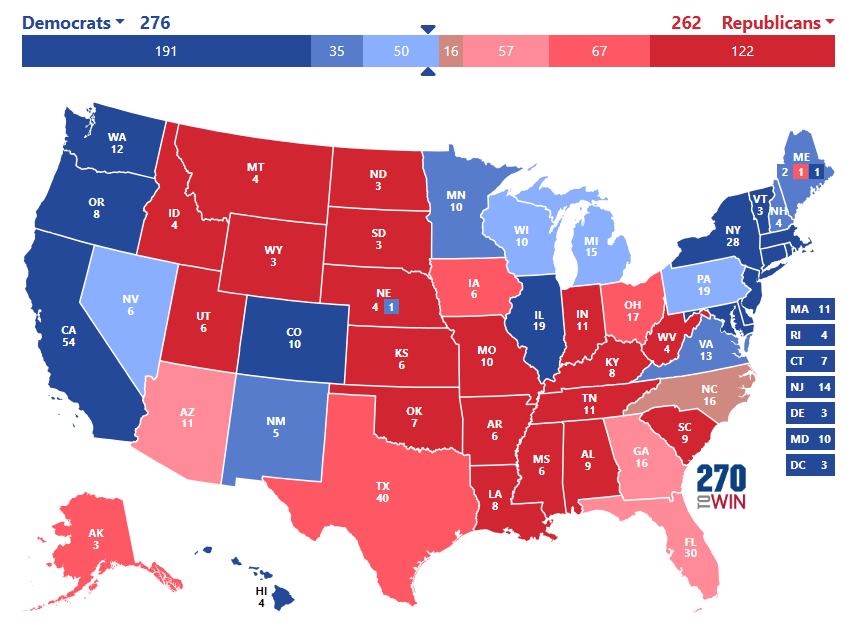
What will the winner of the election win? Resolution should be straightforward, but here's some examples:
Trump wins Georgia and election -> Georgia resolves YES
Harris wins election but with only 287 EVs -> More than 300 Electoral Votes resolves NO
Market closes before voting day. It resolves as soon as results are known. Faithless electors do not count for resolution.
@traders If no evidence comes out by the closing date (end of March) I plan to resolve the remaining options N/A.
If someone can find a timeline for when the data will be available I may consider waiting longer, but as it stands it's unclear when I will be able to resolve and I don't want to wait indefinitely.
@bagelfan the congressional district data should come out before then. You're probably not going to get explicit confirmation on polish-american vote since exit polls don't really track that, but Trump won whites by 15 points and I think it's safe to say polish-americans aren't 15 points more dem-leaning than other white people.
@SentientTree Trump also outperformed Republican house candidates almost across the board and the Republicans won the house, so these are both definitely YES
@SentientTree Yeah I'm highly confident Trump won the Polish-American vote but I'm not going to resolve without any data to confirm
@bagelfan ballotpedia has results by congressional district:
https://ballotpedia.org/Presidential_election,_2020
It doesn't have that for 2024-probably too early for those results to be available.
@traders I resolved all options that can resolve (I think). If I got one wrong or another one can resolve please say so.
This should be higher than 50%. In 2020, Biden and Trump both won exactly 25 states. In order to win this year, Trump has to improve on that performance, and there's no remotely plausible way he could improve on it enough by winning fewer states or the same number (that would require exchanging some smaller states for larger states, but there's no electoral map in which that happens). So the probability of the winner winning a majority of states, conditional on the winner being Trump, is basically 100% (obviously, nothing is exactly 100%, but it's far more than 99%).
On the other hand, Harris can very plausibly win the election with fewer than 25 states. But there are plenty of plausible pathways to 26+, the most obvious of which is Biden+NC. And as explained in the previous paragraph, any situation where she wins more than 25 states is one where she wins the election, so the probability here is basically P(Trump win) + P(Harris wins >25 states). The former probability is already almost 50% since the election is a near toss-up, and the latter is enough to knock it over the edge.
@PlasmaBallin Just realized that I already posted basically the same comment a month ago. But seems like the reasoning has not been heeded
Here's what the race looks like in Silver Bulletin polling (with my best estimate given for states with no polling average, and using 1%, 5%, 10% as thresholds for lean, likely, and solid):

So we're set for an even number if the polls were perfectly accurate. They won't be, of course, but four of the seven closest swing states have even numbers of electoral votes, so if any combination of those flip from expectations, we still have an even number. Same goes for Florida, the 1/2-swing state. To get an odd number of EVs, we either need PA and MI to split their votes, Harris to win AZ, or one candidate to win a state/district that's likely or solid for the other party. (And of course, we need an odd number of these things to happen).
In 2020, the result was 25-25.
So if Trump wins, the chances that he wins a majority of states are basically 100%, since the only way he can win is by exceeding his 2020 performance, and there's no way he could realistically do that while losing more states than he picks up (He would have to win California or New York or something like that in order for this to occur, but even if that happened, he would win in a landslide with a lot more than 25 states).
Harris can win with fewer than 26 states - if she holds the Rust Belt but loses all the Sun Belt swing states, she'll have only 22 but win the election. But she has a shot at 26 if she wins the Biden states + North Carolina, and of course, it's also possible that a bigger surprise happens where she wins one of the tougher red-leaning states.
@bagelfan resolves YES if the potus winner wins a publicized game of monopoly between now and the election.
@Nightsquared use criteria from this market: https://manifold.markets/jacksonpolack/if-kamala-harris-debates-donald-tru
